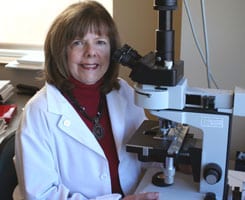Division of Clinical Anatomy
This division is co-directed by David Davies, Ph.D., and Kevin Phelan, Ph.D. This division focuses on our teaching mission, mentoring faculty and providing infrastructural support for innovative teaching approaches in both medical and graduate school courses. It also provides for elective medical courses, and workshops for residents, faculty, and students outside the department. The Division houses the Anatomical Gift program, which is directed by Dr. Kevin Phelan. In all of our courses, we seek to explore innovative teaching and learning approaches, including Team Based Learning, Problem based learning exercises and cutting-edge learning aids in the Human Structure Course.
Division of Translational Neuroscience
This division provides infrastructure and expertise in systems neuroscience to support both primary and secondary faculty, especially those doing work with human subjects. This group is in Phase III of an NIH COBRE award, which has supported and developed the Center for Translational Neurosciences. This Center mentors young clinicians and basic scientists. Its members are exploring ways to eliminate neglect in stroke patients, co-morbidities associated with back pain, spinal cord injuries and rehabilitation, long-term effects of neonatal pain, motion disorders, fetal alcohol syndrome, sleep and psychiatric disorders, depression and cardiac disease, and pain mechanisms. The center has developed cutting edge core facilities that support proteomics assays, Comprehensive Lab Animal Monitoring, and molecular assays. Get more information about the Center for Translational Neuroscience.
Cellular and Molecular Neuroscience Emphasis
We provide infrastructure and core support for faculty working at the cellular and/or molecular level. This was originally funded by a P30 Center grant, which was directed by Dr. Paul Drew. This grant developed cutting edge core facilities and the P30 Center members actually include NINDS faculty from multiple departments. They are doing research in the rapidly growing area of neuroimmunology, including neurotrauma, neuroinflammation, and glial cell biology. Departmental faculty who participate in the Division are recognized internationally for work on Alzheimer’s disease, spinal cord injury, multiple sclerosis, fetal alcohol syndrome, neuroendocrine regulation of growth and reproduction, and immune responses to brain infection. There is much potential for future expansion in this division to meet future programmatic funding needs. Please see the division web page for more information.
Our faculty members are involved in research projects that focus on magnet areas in the developmental sciences, including neuroimmunological aspects of the fetal alcohol syndrome, pituitary cell differentiation, age-related changes in neuroendocrine function, neuroendocrine regulation of reproduction, and molecular regulation of protein synthesis in stem cells and cancer cells.
Our research-oriented Master of Science and doctorate graduate programs offer a flexible menu of courses and laboratory experiences. Our faculty helped develop the Interdisciplinary Biomedical Sciences Graduate Program, and spearheaded the evolution of our current Interdisciplinary Neuroscience Graduate Track.
This continues to be an exciting time of continued growth and development for our department. The state of the art core facilities, the Centers, and the expanded expertise in developmental sciences provide wonderful opportunities for graduate and post-doctoral training. These opportunities are described in greater detail at this website.

Gwen V. Childs, Ph.D.
Professor and Chair
Department of Neurobiology and Developmental Sciences
College of Medicine
4301 W. Markham St.
Little Rock, AR 72205
501-686-7020
Fax 501-686-6382
